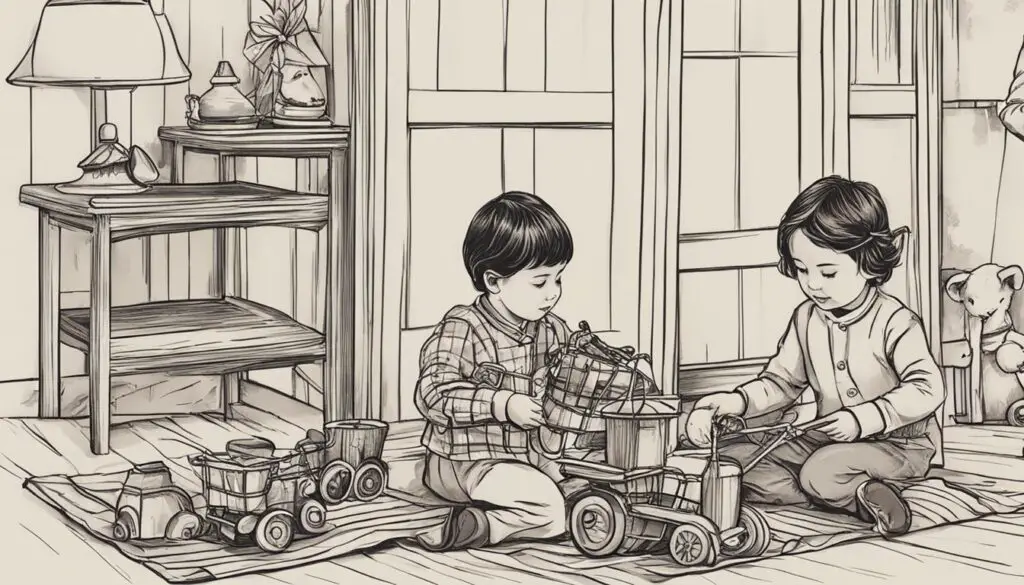
Managing Sibling Rivalry in Your Home
Sibling rivalry is a common challenge that many families face. It can create tension and conflict within the home, making it difficult to maintain a peaceful family environment. In this section, I will explore effective strategies for managing sibling rivalry and fostering a harmonious atmosphere at home.
Key Takeaways:
- Understanding the causes of sibling rivalry is crucial in developing effective strategies for managing it.
- Establishing fairness and equality can help minimize feelings of resentment and competition between siblings.
- Encouraging cooperative play and communication can foster positive relationships and reduce rivalry.
- Creating individual time and space for each child can prevent feelings of resentment and promote sibling bonding.
Understanding the Causes of Sibling Rivalry
Sibling rivalry is a common occurrence in many households, but what are the underlying causes behind this challenging dynamic? By understanding the factors that contribute to sibling rivalry, parents can develop effective strategies to manage it and foster positive sibling relationships.
Causes of Sibling Rivalry:
- Jealousy: Siblings may experience feelings of jealousy when they perceive unequal treatment or attention from their parents. This can stem from a fear of being loved less or losing their place in the family.
- Competition for Attention: Sibling rivalry often arises from a desire to be the center of parental focus. Children may engage in attention-seeking behavior to gain recognition and validation.
- Differences in Personalities: Each child has their own unique personality and temperament, which can lead to clashes and conflicts. Differences in interests, preferences, and temperaments can contribute to sibling rivalry.
Understanding these causes allows parents to tackle sibling rivalry at its root, creating a more harmonious and supportive family environment.
“Sibling rivalry often arises from a desire to be the center of parental focus.”
Establishing Fairness and Equality
Sibling rivalry often arises when children perceive a lack of fairness and equality within the family. As parents, it’s crucial to create an environment where each child feels valued and esteemed, without the need for constant comparisons.
Treating all children fairly: By treating each child with fairness, we can minimize feelings of resentment and competition. This involves acknowledging and respecting their individual needs, interests, and accomplishments. For example, if one child receives a reward or privilege, ensure that the other siblings have an opportunity for a similar experience in a different context.
Avoiding direct sibling comparisons: Comparisons between siblings can fuel rivalry and breed a sense of inadequacy. Constantly pitting one child against another can harm their self-esteem and create unnecessary tension. Instead, celebrate each child’s unique strengths and accomplishments without explicitly highlighting differences between them. Emphasize their individuality and value within the family.
Setting clear rules and consequences: Establishing clear rules and consequences for sibling conflicts can promote fairness and equality. By outlining behavior expectations and consequences for breaking them, children can understand the boundaries and take responsibility for their actions. This helps avoid situations where one child feels unfairly treated or favored.
By promoting fairness and equality, we can reduce sibling conflicts and foster a more harmonious family dynamic.

Creating an atmosphere of fairness and equality requires consistent effort and communication from parents. Encouraging open dialogue and addressing any concerns or grievances individually can prevent feelings of favoritism or inequality from festering. It’s important to remember that each child has their own unique needs and strengths, and providing them with equal opportunities for growth and expression can contribute to a more peaceful and balanced home environment.
Encouraging Cooperative Play and Communication
Promoting cooperative play and effective communication skills can help siblings develop positive relationships and reduce rivalry. When children engage in activities together, they learn valuable cooperation and teamwork skills that can extend beyond their sibling relationships. Encourage your children to participate in shared activities that foster cooperation and problem-solving.
Cooperative play can involve building puzzles, playing board games, or engaging in imaginative play where siblings collaborate to create a story or scenario. These activities provide opportunities for siblings to practice taking turns, sharing resources, and resolving conflicts in a peaceful manner.
Effective communication skills are essential for fostering healthy sibling dynamics. Teach your children the importance of active listening, which involves paying attention to each other’s perspectives and validating their feelings. Encourage them to express their emotions and thoughts in a constructive and respectful manner to prevent misunderstandings and conflicts.
“I think it’s crucial for siblings to learn how to communicate effectively from an early age. By promoting open and honest communication, children can better understand each other’s needs and resolve conflicts in a respectful manner.”
– Dr. Sarah Johnson, Child Psychologist
Parents can also facilitate communication by providing a safe and supportive environment where siblings can express their thoughts and feelings freely. Encourage them to use “I” statements to express themselves and avoid blaming or criticizing each other.
Resolving Conflicts
Conflict is inevitable in any relationship, including sibling relationships. However, providing opportunities for siblings to resolve conflicts on their own can foster independence and cooperation. As parents, it’s important to step in only when necessary and offer guidance to help siblings find mutually agreeable solutions.
When conflicts arise, encourage your children to communicate their needs and concerns to one another. Teach them problem-solving techniques, such as compromising, finding win-win solutions, and brainstorming options together. By actively involving siblings in the conflict resolution process, you empower them to take ownership and responsibility for their actions and relationships.

By encouraging cooperative play and promoting effective communication skills, parents can create an environment that fosters positive sibling relationships and reduces rivalry. Teaching children to work together, actively listen, and resolve conflicts can set the foundation for strong bonds and lifelong connections.
Creating Individual Time and Space
When it comes to managing sibling rivalry, creating individual time and space for each child is crucial. Giving each child opportunities for personal attention can help prevent feelings of resentment and competition.
Plan special activities or outings with each child separately to strengthen your bond and show them that they are valued individuals. Spending one-on-one time with each child allows for focused attention and allows them to express their thoughts and feelings, fostering a deeper parent-child connection.
In addition to individual time, providing designated personal space for each sibling is essential. Each child needs a space where they can retreat to and have a sense of autonomy. This personal space can help reduce conflicts over shared belongings and give each child a place to call their own.
By promoting individuality and fostering sibling bonding through individual time and personal space, parents can contribute to a more harmonious home environment. It allows children to develop their personalities and interests while also strengthening their relationships with their siblings.
FAQ
How can I manage sibling rivalry in my home?
Managing sibling rivalry in your home involves understanding the causes of rivalry, promoting fairness and equality, encouraging cooperative play and communication, and creating individual time and space for each child.
What are the causes of sibling rivalry?
Sibling rivalry can be caused by various factors, including jealousy, competition for attention, and differences in personalities. Some children may feel threatened by the arrival of a new sibling, while others may engage in attention-seeking behavior.
How can I establish fairness and equality among my children?
To establish fairness and equality, parents should strive to treat their children fairly and avoid making direct comparisons between siblings. Setting clear rules and consequences for sibling conflicts can also promote fairness and equality in the home.
How can I encourage cooperative play and communication between my children?
Encouraging cooperative play and communication involves encouraging shared activities and problem-solving, teaching essential communication skills such as active listening and expressing feelings constructively, and providing opportunities for siblings to resolve conflicts on their own with guidance from parents.
How can I create individual time and space for each child?
Creating individual time and space can be done by planning special activities or outings with each child separately to strengthen the parent-child bond. Additionally, providing designated personal space for each sibling can offer a sense of autonomy and reduce conflicts over shared belongings, fostering sibling bonding as well.